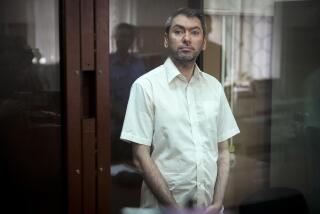Shcharansky, Bonner Hold Bittersweet Reunion
- Share via
NEW YORK — In a bittersweet and dramatic reunion after almost a decade, Soviet dissidents Anatoly Shcharansky and Yelena Bonner hugged and shared memories at simple ceremonies Monday commemorating the Moscow Helsinki Watch Committee that they helped start.
The committee, which monitored human rights violations in the Soviet Union, was broken up by Soviet authorities six years after its beginning, and all of its founding members were arrested.
It was the first time that Shcharansky and Bonner had seen each other since he began serving nine years in Soviet prisons and forced labor camps. He was released in an East-West prisoner exchange in February and emigrated to Israel. She was permitted to leave the Soviet Union because of a severe heart condition and had multiple bypass surgery in Boston in January.
Bonner and Shcharansky were reunited in a private office. They hugged joyously.
Robert Bernstein, chairman of the U.S. Helsinki Watch Committee, said that the two fell into each other’s arms, laughed and “began talking Russian a mile a minute.” The reunion took place in the office of Bernstein, president of Random House, which is publishing Shcharansky’s memoirs.
“Today is a kind of holiday, a kind of birthday for the group,” Bonner said. “There is a Helsinki group not only in the United States but in many European countries. . . . It (the Helsinki process) creates a platform or forum for discussing these issues.”
Both activists stressed that the Helsinki Watch process should continue. They appeared at a meeting of the U.S. Helsinki Watch group after their reunion.
“Our only function was to get public opinion and make available (word of) violations of human rights,” Shcharansky recalled. “I was a spokesman. It was really a test of Soviet institutions.
“The results you know,” he added dryly.
“Despite the fact I have witnessed the arrest of many members of the group, I think despite these arrests, we should continue the Helsinki process,” Bonner said. The wife of Andrei D. Sakharov, the Nobel Prize-winning physicist, is scheduled to return to the Soviet Union in June to rejoin her husband in internal exile in Gorky.
Bonner was asked if she was nervous about returning to her native land after medical treatment in Italy and the United States.
“I am always expecting the same terrible thing,” Sakharov’s wife said. “I like to anticipate terrible things before they happen,” adding that her fate and that of Sakharov depend on what the West will allow to happen to them.
In August, 1975, 35 nations, including the Soviet Union and the United States, signed the Helsinki Accords at a meeting in the Finnish capital. The signatories pledged to respect human rights and fundamental freedom, including the freedom of thought, conscience and religion.
The following May, the Moscow Helsinki Group was formed. In its six years of operations, the committee prepared 95 formal reports on human rights issues and released numerous statements and appeals.
As the Soviet government clamped down on its activities, many of the group’s appeals focused on the plight of its members who were arrested.
More to Read
Sign up for Essential California
The most important California stories and recommendations in your inbox every morning.
You may occasionally receive promotional content from the Los Angeles Times.











